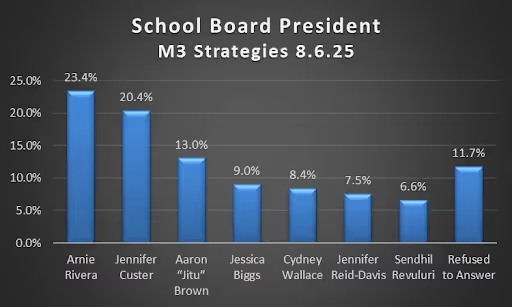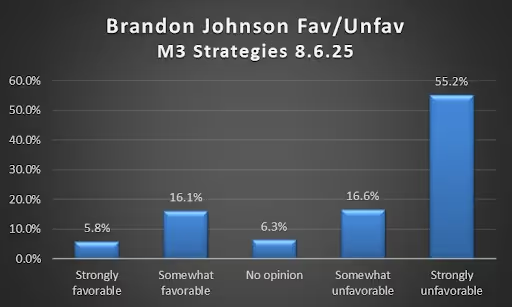M3 Strategies Poll: Johnson and CTU Will Be Toxic in the First-Ever Chicago School Board President Election in 2026

The race to lead the School Board is wide open and the mayor's favorability still stinks
The 2026 election cycle is certain to reshape Illinois politics. When Senator Richard Durbin announced in April he would step down after serving five terms, a rare release valve for political ambition blew open. Four congressional seats are now up for grabs, Governor J.B. Pritzker is eyeing an unprecedented third term with Christian Mitchell on the ticket, and all signs point to Representative Margaret Croke preparing for a run at statewide office as comptroller.
The March Democratic primary will effectively determine the winner in the November general elections, and the races will be flush with hundreds of millions in spending. Nevertheless, while most of the state unwinds after the March primaries, Chicago’s most important election will still be undecided: The race for president of the Chicago School Board. Chicago Contrarian commissioned a poll with M3 Strategies between 24-26 July on this consequential election. Considering the tumult in CPS and the current budget gap CPS is confronting, Contrarian believed it was essential to measure public opinion over this election, which is certain to shape the future of Chicago’s public schools.
In November 2026, voters will, for the first time, cast ballots to elect a citywide president of the CPS Board of Education. Though several names have been bandied about, and a complete list of potential candidates for Board president can be seen in the poll memo, it is a deeply fractured race. Of the eight possible contenders, only three possible candidates surpassed 10 percent. Among the leading candidates are former Rahm associate and McPier Chief Equity Officer Arnie Rivera, who received 23.4 percent; vocal Johnson critic and current Northwest Side Board Member Jennifer Custer earned 20.4 percent; and Dyett Hunger Striker and West Side Board member Aaron “Jitu” Brown received 13 percent.

While several candidates not included in this survey are likely to emerge in the coming months, at this juncture, the poll is intended to underscore the factions which are certain to have an interest in the outcome of the School Board election.
To understand precisely why we selected the individuals and groups we chose as subjects for our survey, it is important our audience and voters grasp our goal was to capture voter attitudes and concerns by virtue of the fact school board elections tend to be overlooked. A schooling system facing multiple crises, each individual and group with an interest in the Board race has advanced drastically different approaches to solve the challenges CPS confronts. It is our ambition this poll will serve as a reminder to voters the School Board election is consequential, Board leadership matters, and the Board will shape every aspect of our children’s educational journey.
First and most notably, the Chicago Teachers Union and its allies are concerned with schools for obvious reasons: Working conditions, wages, and pensions. In addition to the CTU, other local unions associated with CPS have an interest for similar reasons or often because CTU has been poaching their members. Naturally, the Chicago Federation of Labor, the umbrella organization under which the CTU rests, makes an appearance in our poll.
Business groups, the civic-minded, and school choice advocates often share overlapping interests regarding our schools. They see what many voters see: A bloated bureaucracy which is largely failing our children and as businesspeople, they believe they can fix it. Second, they know an educated workforce is essential for economic development and driving growth. Third, less admirably, saving money in taxes and landing contracts from the district is also a matter we took into consideration. These groups vastly outspent CTU and the union’s allies in the last school board election, with mixed results. Finally, there exists a third group: Other elected officials. From Washington, D.C. to City Hall, schools are the backbones of communities — and those communities elect their leaders. Being on the right side of the next president of the CPS school board will carry advantages. Nearly every alderman, county commissioner, state legislator, and member of Congress weighed in on their local school board races last cycle — the School Board elections in 2026 are certain to draw the same, if not greater, attention.
Survey results
Unsurprisingly, Mayor Brandon Johnson, the Chicago Teachers Union, and both individuals and groups with ties to the fifth floor — give voters pause. In a surprise revelation, when asked about the part monied donors play in elections — uber-wealthy-funded C4s, such as Common Ground, Leadership for a Better Chicago — respondents expressed a distaste with an election in which the affluent exercise an undue influence. Along those same lines, by a 60 percent margin, voters are less likely to vote for a candidate funded by a member of the privileged class. The overriding message sent by respondents is the CTU and its opponents, the affluent, are both equally disliked and will likely be the polarizing foils in negative campaign advertisements for the School Board president's race.


Aside from a general skepticism for Mayor Johnson, the CTU, and Chicago’s donor class, voters did convey generally positive sentiments with regard to their alderman, their local union, the Chicago Federation of Labor, business groups such as the Realtors or Chamber of Commerce, and the notion of school choice.
While there are certain wards in which residents have a dim view of their elected representatives or disapprove of the CTU, the results of this poll demonstrated Chicago residents surveyed tend to have a favorable view of their representation in the City Council. It is worthwhile to mention respondents were most pleased with aldermen who concentrated mainly on ward work: Fulfilling 311 requests such as providing garbage cans, turning out at neighborhood functions or responding to emergencies.
The survey also revealed respondents do indeed have faith in and trust their elected leaders, which can translate into political capital in city-wide races, such as the Chicago School Board president race. Voters also trust “their” local union and the Chicago Federation of Labor, which seems right owing to aldermen having a tangible impact on the quality of a resident's life. School choice was also greeted warmly by respondents, which is not too terribly surprising, particularly in regard to the fact residents desire to exercise as much independence over their children's education.
One outcome of the poll Contrarian found worth highlighting specifically is the only real issue-based question: The presence of Chicago Police — Student Resource Officers (SROs) — in CPS. A salient issue in the previous election for School Board, this issue is a winner: 47 percent of voters are more likely to vote for a candidate who supports a particular issue, and half of respondents stated they would be less likely to vote for such a candidate. This is an issue which we believe defines the school board race more broadly, and which is about student success and safety. If a candidate opposes SROs in schools, as the CTU and Mayor Johnson do, both the mayor and the CTU must be prepared for a cascade of criticism.
From these findings, we have drawn the conclusion Chicago voters will not receive a reprieve after what promises to be a bruising Democratic primary season. Chicago should brace themselves as the Chicago Teachers Union spreads fictions and make promiscuous use of its slander machine to maintain its stranglehold over the School Board. Similarly, Chicago should be prepared to cynically watch Chicago’s donor class spend an inordinate amount of money on glossy mailers and flood the airwaves to take control of the schools our children attend, which could have been used to educate them. In the end, buckle up because there is $10 billion at stake to determine who will control the 4th Largest School district in the country.
